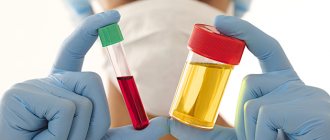Green poop in a baby can be the result of various reasons, including those that do not harm his health. However, when green stool appears, it is important to pay attention to factors such as stool consistency, frequency of bowel movements, odor, and the presence of impurities.
If you have any doubts about the child’s well-being, you should urgently seek advice from a specialist, since this symptom may also mean the presence of pathology in the child’s body.
Why does a newborn have green stools?
You can change the color of your stool:
- food dyes - artificial or natural, if the nursing mother ate foods with them (later, when the baby begins to receive complementary foods, the stool may be colored by the foods he himself ate);
- medications taken by a nursing woman or child, for example, iron supplements, antibiotics;
- intestinal bacterial and viral infections;
- features of the composition of bacteria in the intestinal microflora
- allergic reaction.
A newborn's stool may turn green due to the way his digestive system is still immature.
Reasons for breastfeeding
If a newborn's stool is dark green, it should turn yellowish after 7-10 days. But the baby’s digestive system has not yet fully formed, so the stool reacts by changing color to all food and even to external factors. Overheating, severe stress, overfeeding or lack of nutrition, fungal or parasitic diseases - all this can cause digestive disorders.
In addition, a 1-2 month old child often has dysbiosis. After all, the intestinal microflora is formed gradually; after birth, it still does not contain the necessary lacto and bifidobacteria.
A greenish color can be given to it by a large number of hormones in a woman’s body and the nature of her diet. Baby's bowel movements may change when mom takes certain medications, especially iron supplements or antibiotics. If she eats a lot of greens or green vegetables, for example, zucchini, broccoli or parsley, light green stool in the baby is normal. This also happens after 4-5 months, when the baby is given complementary foods - the stool may turn the color of the food.
The color of an infant's stool often changes when it is not attached to the breast correctly. Breast milk is heterogeneous in its composition. At first it is liquid and contains few nutrients. Then comes milk that is fattier and more nutritious. Sometimes it happens that the baby does not suck out this most valuable “hind” milk. Due to a lack of nutrients and fats, a child’s stool may acquire a greenish tint and become foamy and liquid.
The color of a baby's stool depends greatly on the proper organization of breastfeeding.
In addition, there are other reasons for the appearance of stool of this color in a month-old baby:
- bilirubin accumulated during intrauterine development is released;
- mother takes iron supplements or antibiotics;
- lactose deficiency;
- low immunity.
When should you see a doctor?
If, in addition to green stool, your child has any other alarming symptoms, you should definitely consult a doctor.
It is important!
You should immediately seek medical help if your newborn develops diarrhea, that is, diarrhea (with or without vomiting). A baby can quickly become dehydrated, which is life-threatening!
In addition to frequent loose stools and vomiting, the following symptoms require visiting a doctor:
- increase in baby's body temperature;
- decreased appetite or refusal to eat;
- skin rashes;
- pronounced anxiety of the child, which may indicate abdominal pain.
List
- A newborn's stool may turn green due to food, medication, or illness.
- Green stool is normal if it does not affect the child’s well-being in any way.
- If your baby's stool turns green once, this is not a cause for concern.
- A bottle-fed baby may develop green stools when switching to a formula with hydrolyzate or due to frequent changes of the formula.
- You should consult a doctor if green stool is accompanied by diarrhea, vomiting, fever, loss of appetite, skin rashes, and abdominal pain.
(1 ratings; article rating 1.0)
Share Share Share
How often should a newborn poop?
How often your baby walks will vary as he grows and his digestive system develops. The type of feeding also affects the frequency of stool.
BEST PRODUCT
Pampers® Premium Care™ for Newborns
If you are breastfeeding
In general, if a baby is breastfeeding, he or she will likely pump more often than formula-fed babies. Two to five dirty diapers a day is the average frequency until your baby is about six weeks old.
Keep in mind that sometimes breastfeeding babies between three and six weeks of age may not poop for several days. This is because a baby's digestive system can digest breast milk very efficiently without leaving waste.
Once your baby is six weeks old, the frequency of bowel movements may decrease. One reason is that by this time, breast milk usually no longer contains colostrum, which can act as a laxative.
If your baby eats formula
If your baby is fed exclusively or primarily formula, he may start pooping at least once a day a few days after birth. That being said, it's okay if he doesn't poop for a day or two, as long as when he finally does, his stools are soft.
If at any time you are concerned about your baby's stool, consult your pediatrician.
Preventive actions
To avoid problems with the baby's bowel movements, the mother needs to carefully monitor the baby's nutrition, especially during the period of introducing complementary foods (2-4 months).
Introduce new foods into your infant’s diet gradually so as not to disrupt the fragile digestive system.
Often vegetable and fruit purees change the color of stool:
- green;
- red;
- yellow;
- with an admixture of white.
Walking in the fresh air helps increase the body's defenses. Visit parks, gardens and groves with your child more often.
An attentive and caring mother will always notice changes in her child. Even if there are no obvious symptoms. A mother's heart cannot be deceived; it always senses when the baby needs help. Love your children, show care, because the spiritual harmony of the child and mother is a kind of barrier against many diseases.
Treatment of gastrointestinal tract in children
After the doctor examines the results of the tests, he can diagnose the baby. Depending on the development of a particular pathology, various medications can be used. It is worth noting that most problems with the gastrointestinal tract can be solved with the help of a special diet and taking safe medications. But more severe conditions require hospitalization.
Medicines
If the stool is green or the child begins to be bothered by various problems with the digestive system, then you should immediately visit a doctor. Ignoring the symptoms will certainly lead to serious consequences. In such cases, medications are used to help normalize metabolic processes in the child’s body. Below are the most effective ones.
Table. Drugs to improve digestion in infants.
| Name of the drug, photo | Description |
| An effective medicine that comes in the form of drops. Suitable for infants and slightly older children. This drug is incompatible with fermented milk products, which the doctor must inform parents about when prescribing. | |
| It is used in the treatment of various pathological disorders of the gastrointestinal tract, as well as for their prevention. Most often, the drug is prescribed to infants, but older than 14 days. Great for transitioning your baby from breast milk to formula. | |
| A common dietary supplement (dietary supplement) used to normalize the functioning of the gastrointestinal tract. With regular use, the product helps improve intestinal microflora. It has no contraindications, so it is often prescribed to children. | |
| An antimicrobial drug with bactericidal and bacteriological properties. Used in medicine in the treatment of acute intestinal infections and other pathologies of the gastrointestinal tract. Helps cope with various types of diarrhea. Helps normalize intestinal microflora. | |
| An excellent detoxifying medicinal product used in the treatment of intestinal disorders, infectious diseases, diarrhea, gastritis and other disorders of the digestive system. The action of the drug is to neutralize harmful substances that are in the stomach. Excellent for dysbiosis in children. | |
| Another product that contains beneficial bacteria. This is a dietary supplement available in powder form. Used for various gastrointestinal disorders (dysbacteriosis, prolonged diarrhea, metabolic disorders). Another dietary supplement is actively used in the treatment of infectious diseases affecting the organs of the digestive system. |
If the stool has a characteristic green color in a baby who is fed formula or breast milk, this phenomenon can act as both an indicator of normality and a sign of a serious illness. What exactly the change in color indicates in a particular case can only be said by a doctor after laboratory tests. You cannot judge the baby’s health only by the color of the stool, because an integrated approach is important here, which consists of taking tests, interviewing parents and examining the child with a doctor. Only on the basis of all the information can a conclusion be drawn.
How to tell if your baby has pooped
A baby's stool may not have a strong odor, especially in the first weeks of life. How do you know when it’s time for your baby to change his diaper?
You may notice your baby straining and his face turning red from exertion. Over time, you will understand by the expression on your baby's face that he is pooping. And when the baby begins to stand and takes his first steps, he will begin to squat when he is about to poop.
If you are not sure whether your baby has pooped, simply pull the diaper by the waistband and check without removing the diaper itself. If the diaper is the right size, the waistband will snap back into place when you release it. Find out more about how to choose the right diaper size.
Baby's first stool
Of course, any mother worries about her baby. This is especially noticeable in the first days of the baby’s appearance in the house, when the acquaintance of mother and child is just beginning. These days, any slightest change in a child’s behavior can cause severe panic in a young mother. Last but not least, this applies to changes in the newborn’s stool. Whether there is a change in the color or consistency of the baby's stool, the mother will worry in any case, although such changes are a completely natural phenomenon.
First of all, such changes can be influenced by both the developmental characteristics of the child’s body and the health status of the mother, what she eats, what vitamins and medications she takes. This also applies to such cases as green feces in infants. But, of course, one should not exclude possible causes that require the attention of a doctor. This can be either the influence of pathogenic bacteria or the manifestation of various diseases or developmental disorders. How to distinguish a normal stool from one that should be paid attention to?
These are the questions young mothers ask themselves when they notice changes in their baby’s stool and what needs to be done in this case. There is no need to panic under any circumstances; you need to understand the reasons for this phenomenon. At the birth of a baby, his intestines are filled with meconium - a special mixture of amniotic fluid interspersed with gland secretions and intestinal cells. The normal color of meconium ranges from green to dark green or even black. Then the child has a transitional change in feces. In this case, the baby's green stool color is normal.
Causes of green stool in children under 1.5 - 2 years old
Since the gastrointestinal tract is initially immature and does not have enough enzymes to process food, some malfunctions are possible, which will be accompanied by green feces.
The following factors can affect the green coloration of stools:
- changing the diet of a nursing mother (if breastfeeding is natural);
- replacing the mixture with another;
- excess sugar in the mixture;
- excess iron in the mixture;
- indigestion in a baby;
- introducing the first solid food into the baby’s diet;
- teething, when a child pulls various objects into his mouth and thus introduces bacteria into the stomach.
Here you have the opportunity to track the child’s reaction and eliminate some of the reasons yourself, for example, choose a suitable formula, adjust your diet, or postpone the introduction of complementary foods.
If after such changes the stool still remains green, consultation with a specialist is necessary, because perhaps the reason lies deeper.
If a breastfed baby is not properly applied to the breast and sucks out only the liquid front milk, but not the richer rear milk, then his stool may be more liquid and have a green color. Therefore, it is so important that the baby drinks the rear nutritious portion of mother’s milk.
How to treat a child?
All measures that the doctor will take depend on the test results:
- If the cause of the child’s poor health is an unsuitable formula for feeding, then replacing it will solve the problem. Today, the market for mixtures is replete with a variety of prices and quality. Therefore, choosing the best option for your child will not be difficult.
- Problems with stool caused by the use of medication can be successfully resolved by stopping the medication. For example, antibiotics destroy the intestinal microflora, which is why, after finishing taking them, you should take a course of probiotics.
- The doctor will treat the identified infectious, viral or bacterial disease on an individual basis. Based on the test results, the pediatrician will prescribe effective treatment for the small patient.
The child’s nutrition is of great importance in this matter. It is advisable to transfer him to at least mixed feeding, if possible.
The baby should be fed frequently (every 2-3 hours), but the portions should be small, and do not forget to give plenty of fluids to drink.
Allergic reaction
Sometimes green stool is a sign of an allergic reaction to a certain product. In this case, a change in the color of stool is combined with skin rashes, and respiratory rhythm may be disrupted. The product that triggered the allergy may be present in complementary foods or in the mother’s diet if the baby is still receiving breast milk. After removing the irritant from the diet, the child’s condition improves without additional effort.
Back to list Previous article Next article
Preventing the problem from occurring
Knowing why a baby's stool may turn green, you can try to prevent this problem. A nursing mother should monitor her diet, eating only approved foods, while monitoring the baby's reaction and avoiding overeating. It is useful to take special nutritional supplements for women who are breastfeeding. Take care of proper breastfeeding: the baby should receive both fore and hind milk.
Regardless of the reason for the appearance of dark green stool in a child, you should not self-medicate. To understand why the disorder occurred, you need to consult a specialist, especially if the baby’s well-being is impaired. Only a pediatrician, after a thorough examination, will be able to give useful recommendations or prescribe the necessary medications.
How is diagnosis carried out?
If there is green stool in combination with other unpleasant symptoms, the baby will undergo standard tests. In addition, scatology is recommended. The study examines the physical and chemical properties of feces. This diagnostic method will help determine the cause of the change in its color. If necessary, a dysbacteriosis test is prescribed. This will allow you to assess the composition of the intestinal microflora and detect violations.
If there is a problem, the specialist will recommend a diet and prescribe medications that restore the balance of microflora. If inflammatory processes in the intestines are suspected, flora culture and bacteriological analysis will be recommended. After diagnostic tests, the doctor will prescribe a course of therapy, if necessary.










